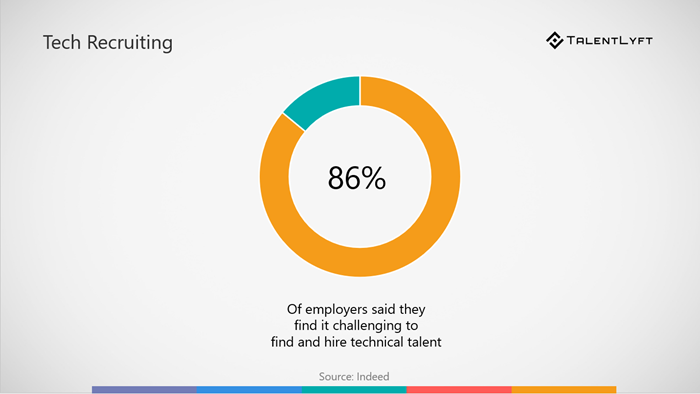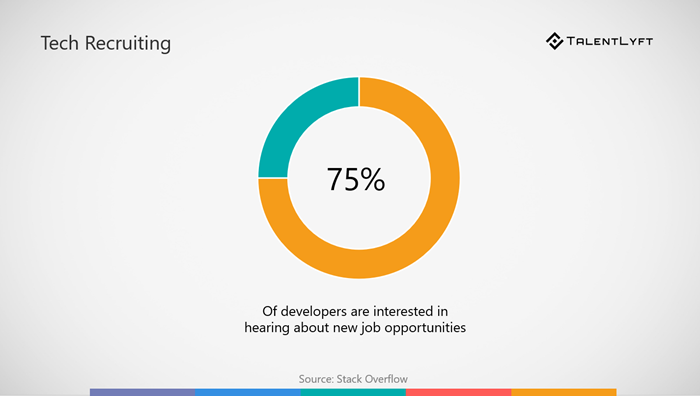![https://adoptoprod.blob.core.windows.net/article/YVboWWwJSkC9CRyjt7LoTw.png?8713]()
Good news for employers looking to hire full stack developers
Recruiting developers is the main challenge for many HR professionals and recruiters worldwide.

Luckily, the demand for full stack developers is not so high as it was about a decade ago because now employers prefer narrow specializations.
Moreover, according to a recent survey by StackOverflow, almost half of surveyed professionals – 48.2 % - responded that their role was a full stack developer.
So if you are looking for a full stack developer, you will not experience talent shortage.

However, there are still certain moments that you should consider. In this article, we are going to talk about the best ways to hire a full stack developer.
➡️ Download free eBook: Definite Guide for Recruiting & Hiring Developers!
What are the tasks of a full stack developer?
A full stack developer is someone who is proficient in programming languages for both the back end (PHP, Python, .NET) and front end (JavaScript and its frameworks). Being responsible mostly for the back end, they should also know the front-end languages to manipulate how the website or application looks at the user’s end.
Companies prefer to hire full stack developers because of saved costs – they do not need to hire individual developers per technology. However, you must be careful when hiring this type of programmers and double check their profiles at job portals. This is because many developers who call themselves full stack can actually have superficial knowledge of several technologies.
Where to find a qualified full stack developer?
Places where you can find and hire a development team for your project highly depend on the collaboration model that you choose. It can be one of the following:
In-house team
This is the most traditional collaboration model. The team is located in the same country, city, and building with you, and their salary depends on the local cost of living.
Remote nearshore collaboration
The team is located in the same or slightly different time zone with the head office but in another city or country, and your collaboration is mostly remote, with occasional onsite visits.
Remote offshore team
The developers are located in time zone other than yours, typically on a different continent, and your collaboration is remote. Sometimes you never meet the team members in person. This option is good for startup founders because they are often tight on budget. But with an offshore development team, they can get reasonable prices stipulated by the cost of living in an offshore country.
Distributed team
There is no head office and all employees are dispersed all over the world, across the different time zones. This option is the toughest one in terms of management but it can be perfect for startups in terms of costs as you will incur almost no overhead. All you have to pay is the developers’ salary.
Now, depending on the chosen collaboration model, here’s where you can find development team.
In-house team
Job boards such as Glassdoor or Indeed and professional networks such as LinkedIn.
Remote nearshore / offshore team
Review websites such as Clutch, freelance portals such as Upwork or TopTal, job search portals for startups such as AngelList, tech talent marketplaces, local software agencies and web dev shops.
Distributed team
Networking, hackathons, recruitment agencies, freelance portals such as Upwork or TopTal, job search portals for startups such as AngelList, and tech talent marketplaces.
➡️ For more tips and tricks on finding tech talent check out our blog post Quick tips on how to source IT specialists!
Interview questions to ask a full stack developer
It may be hard to interview the full stack development candidates because this position is quite broad and involves a lot of skills.
During the interview, your task is to find out if the candidate’s knowledge is deep enough across all technologies in question.
Here are some examples of questions you can ask:
Question #1: Tell about one of the projects that you worked on and the technologies that you used. How did you make these choices?
An answer to this question will help you find out whether the candidate knows the full stack development methodology. Check if they are specific enough while justifying the reason for choosing a specific toolset for both the back end and front end.
Question #2: What technologies would you need to build a project from scratch?
If you are a startup founder, an answer to this question will show you the readiness of your candidate to work in a dynamic startup environment. If they can quickly come up with languages and technologies and roughly describe the process, then you can be sure that this candidate is a perfect fit for your project.
Question #3: What is the most recent thing that you have learned?
This question is used to test if the information provided by the candidate is accurate enough – in other words, are they really full stack. It is important that they know the latest trends in the industry and constantly learn something new because the world of technology is changing at a lightning speed.
Question #4: Do you have experience working remotely?
This question is a must when you are hiring a remote team member, especially when you work in a distributed team. Brick-and-mortar companies can hire trainees without prior experience, but this is not the case with remote work because not everyone can handle it. When hiring remote employees, you need to pay attention to their previous remote experience.
Question #5: Tell about the recent programming challenge that you have experienced when working in a team. How did you overcome it?
An answer to this question will show you how the candidate responds to critical situations. It will also show you their ability to work in a team and collaborate with the team members in such situations.
Additional questions to ask
And of course, you should ask questions pertaining to a set of technologies that you need for your project.
➡️ Check out our Technology Glossary for Human Resource (HR) Professionals written for recruiters and HR managers.
If you are a non-technical co-founder of a startup, then a technical part of questions should be asked by a CTO.
Key takeaways
Looking for a full stack development team to work on your project may be a challenging task. You must be aware of the project requirements and collaboration model that you choose, be it an in-house or offshore team.
During the interview, it is important to test the candidate’s skills and experience and thus get a proof that they are equally proficient in all technologies within their stack.
If you’re looking for more tips on hiring developers, check out Tech recruiting guide. Good luck in finding your perfect candidates! 🙂
About the author
Anton Mishchenko is CEO and Co-founder at YouTeam, a Y Combinator-backed marketplace connecting top tech companies with the best software engineers and development shops around the world. Anton’s area of expertise includes tech entrepreneurship and digital marketing, business development in the music and media industries.


















